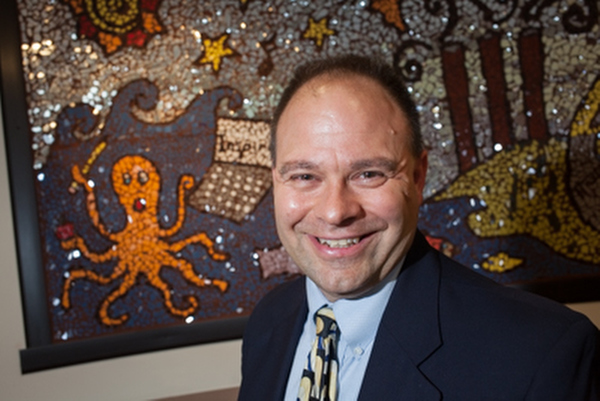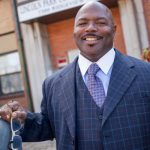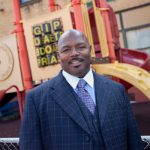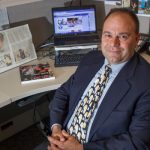
Helping men be better dads, with great results
Helping men be better dads, with great results
When men realize they haven’t been the dads they want to be and finally feel free to talk about fatherhood, their experiences can be a revelation to each other – and a huge help.
East Allegheny Center Fathers Group
That’s what happens at the East Allegheny Family Center Fathers Group in Wilmerding, which meets once a month – one of five voluntary fathers groups run by the Allegheny Intermediate Unit (AIU) 3. The men agreed to let Kidsburgh listen in if their names were changed.
“I always said, growing up, I never wanted kids,” volunteered Perry, sitting with half a dozen other fathers on an October evening. “That changed real quick.” Today he has joint custody of his pre-school son. “I’m the one who will slap them and yell at them, because that’s how I was raised. I am trying to change that.” At that moment, his own son, playing with other pre-schoolers in another room, came up to be held.
“I never thought I was going to be a single parent at my age,” said Les, whose oldest kid is an adult, but who has custody of a young son. The boy’s mother is in jail. “I’m learning a lot, seeing how other people handle the situation. I wasn’t there” for the first son, he said. “I thought being a good dad was making as much money as you can. But kids, all they want is your time.”
He recalled phoning shelters when housing became a problem in recent years but finding no place for a man and his child.
“I want a GED so badly,” he added. “They’ll pay for you to go to class. But who will watch your kid?”
Dads can join a Fathers Group when their kids use the family center for its developmental specialists, Head Start program or other services, or when they are simply looking for help. If they can’t attend the evening meetings due to work schedules, facilitator Art Johnson brings its program to their homes.
The program offers information on everything from “Ways to Understand Your Child” and “How to Discipline with a Gentle Spirit” to training on being a good role model and literacy. While the lessons are based on the Doctor Dad curriculum of the National Fatherhood Initiative, attending the group can connect these fathers to help with job readiness or case management (if they and their kids are involved in the courts).
Finding ways to connect with help was tough before he found this group, Les said. But he also admitted, “My pride gets in the way… I’m afraid to ask questions and ask for help. I don’t know how many times I called Art and the phone went clunk. I finally called him. He was so easy to talk to, and he listened to me.”
Listening to your partner and family is what today’s fatherhood lesson is all about.
“By being quiet we win all the time,” joked Michael, another father in the group who had apparently decided to listen more at home. “When the game comes on, I can’t hear nothing. I’ve learned I’ve got to get up and [respond] now. The game ain’t going nowhere.”
Johnson asked the men to take a quiz to see what listening strategies they’ve used–or ignored.
“We use a lot of things to filter out listening, and that in the end affects our children,” he said. “They pick up on what we’re doing. We don’t always realize what we are teaching them all the time.”
“I learned the fine art of keeping my mouth shut today,” said Darius afterwards. “It’s about being more kind than being more right.”
FATHERS Collaborative Council:
The Fathers Group not only has the support of the AIU but also the FATHERS (Fathers Alliance Together Helping Each Reach Self) Collaborative Council, a group of 34 local agencies that joined forces, from local ministries and the Pittsburgh Public Schools to the state government and the county’s Office of Children, Youth and Families (CYF), which offers parents’ services and also steps in when families get in trouble.
The Collaborative Council began five years ago and now holds educational workshops and four major public events every year. Its fatherhood awards will take place Dec. 13, and on Feb. 8 it will hold the third annual father-daughter dinner dance, which drew 200 last year. The group also organizes a father-kid camping trip and another excursion; last year, 250 fathers and their families went to a Pirates game.
The AIU’s Fathers Groups happen each month here and at the Sto-Rox, Lincoln Park and Highlands family centers as well as the Latino Family Center in the South Side. Each meeting draws from five to 50 fathers. “If they would be served better by one of the other programs” run by one of the other 33 Collaborative agencies, says Larry Klinger, who is in charge of the AIU3’s fatherhood initiatives, “we have no problem referring them to another program.”
Fathers sign a contract to participate in the Fathers Group and receive a certificate for completion; many of these fathers have been attending the group for years. Johnson says the cooperation among the Collaborative Council is a big help in continuing to find resources for these men and their children: “The different fatherhood programs, we acted like crabs in a barrel before. We came together so we can serve our fathers better.”
“These meetings have allowed us to start the relationships and model positive behaviors,” Klinger said. “Some of these guys are rough in here, no doubt about it. But that’s why we try to get them involved in the FATHERS Collaborative Council.”
“When the guys know better, they do better,” Johnson added. “A lot of us don’t know anything better than what they were taught.” He recalled watching the mostly urban fathers interact with their kids at the Council’s camping trip this summer, held at the Family Resources retreat center in Cranberry. The families went together through the confidence-building rope course. He marveled at their reactions: “To see the kids pleasing their dads and the dads being satisfied at being able to encourage their kids to do something they didn’t want to do …”
Reuniting fathers and kids
One program for fathers whose kids are in the county’s child welfare system – Dads Assisting Dads – has gained such a reputation for effectiveness that it attracted four judges from the Court of Common Pleas’ Family Court system as speakers at its most recent event on Oct. 23.
“I brag about this program,” said Judge Michael F. Marmo. “This DADS program really touches my heart.”
In its three years, DADS has reunited 14 fathers with their kids following court cases. It puts members through a 26-week program – soon to be reduced to 16 weeks – to help them navigate the legal system, gain help with employment, housing and food, and support them through their efforts to improve themselves and convince the courts that they are involved in their kids’ lives, and thus worthy of custody.
New state rules are coming, Judge Arnold Klein told the DADS meeting, which will place more pressure on courts to involve fathers in child custody and related cases.
“We need to really search out and find fathers – that’s the first thing we have to overcome,” he said. But, he added, “this program does work.”
“If the dads come into the program and have an open mind and a willingness to listen and learn, there’s a lot of information that comes through these meetings,” said DADs member George Gilmore. “We are fathers and we are here to stay.”
Raymond Johnson, of the Hill District, who has been in program for two years, had his case closed in May and now has custody of his son, 2, and daughter, 8. He said his kids were taken from him and his girlfriend because of the “deplorable conditions” in which they were living.
“Because of the DADS program I was able to get the kids back,” he said. It taught him “accountability, being a father and being responsible – holding myself responsible for getting my kids back in my life. I was tired of just visiting them.”
“The conversations we have at meetings are father to father, grandfather to grandfather, and, most importantly, man to man,” noted Al Martin, co-facilitator of the DADS program. Martin worked in the CYF foster-care department for 21 years, retired, but came back out for this group. He said it brings fathers “from the fringe into the fold … We help them vent for a short time and then to move on. We don’t tolerate any hustle. Guys used to getting things done by smoke and mirrors – we let them know the best route to take is to improve themselves… and focus on their children.”
“Our job is to ensure that children are safe,” said DADs facilitator Jerry Harvey, who also works for CYF. “We want the kids to say, ‘My dad brought me up like that.'”
Leading by example
After the East Allegheny Fathers Group ended, Zeke, in his third year with the group, ruminated on what brought him here – and where he is going:
“My wife, we’ve been together 13 years,” he said. “We both wanted to live in households unlike the ones we grew up in. My situation was so unstable. I wanted a stable environment. There are books on [child raising], and you probably think you’re doing the right thing, but you always want to know other peoples’ perspective.
“There are guys who come here because they’ve had a problem, but there are guys here just because they want to be a better father. I liked the fact that there were resources and informative discussions of what your kids were going through.”
Just then, his own child walked up.
“You clean up your mess,” Zeke said to the boy evenly. “The quicker you clean up the quicker we can leave.”
“I didn’t make a mess,” the boy replied.
“Bobby,” said the father to his kid, “lead by example.”





